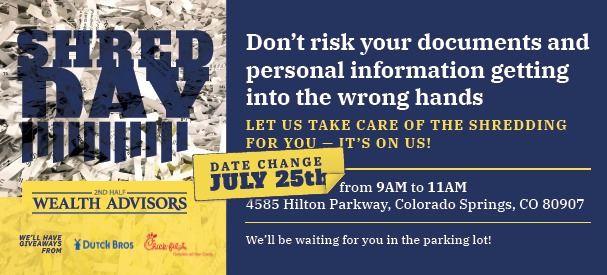Shred Day!
Well April 15th has come and gone, and July 15th is fast approaching. Do you know what that means? It means you have just one more step until you relax until next tax season…
Go through your documents and prepare 3 boxes, bags, storage containers, whatever floats your boat, and bring it to our free Shred Day, Saturday, July 25th between 9:00am and 11:00am.
Register Here
Why you ask????
Because it is important to shred your documents to keep your identity safe and, if you own a business, to keep your employees’ and clients’ identities safe. Identity theft crimes have increased during the Corona Virus pandemic, as Americans working from home are becoming more of a target.
Top 3 Reasons to Shred Your Important Personal and Business Documents
In today’s day and age, every business collects and maintains sensitive information. Although many businesses are making the shift to storing data electronically, there are still many businesses that store paper files. If you own one of those businesses, you may be wondering what to do with those important documents when they’re no longer needed. Customer lists, payroll records, and credit card information are all things that should be shredded when you’re ready to dispose of them. Wondering why it’s so important to shred important business documents? Here are the top three reasons:
1. Prevent Identity Theft
2. It’s the Law (If You Own a Business)
Legislation regarding information privacy and security is getting more and more rigorous, and it continues to be strictly enforced. Penalties can be severe for businesses that fail to comply with these regulations. You have a duty to protect your customers’ personal and secure information, and if you don’t, you’re at risk of receiving fines for mishandling customer information.
3. Eliminating Clutter and Fire Hazards
Documents You Should Be Shredding
Wondering what kinds of documents should go through the shredder? Here are some examples:
- Tax returns
- Photo IDs
- Bank statements
- Voided checks
- Employee pay stubs
- Credit card information
- Copies of sales receipts
- Documents containing sensitive information such as name, address, phone number or email
- Employment records





